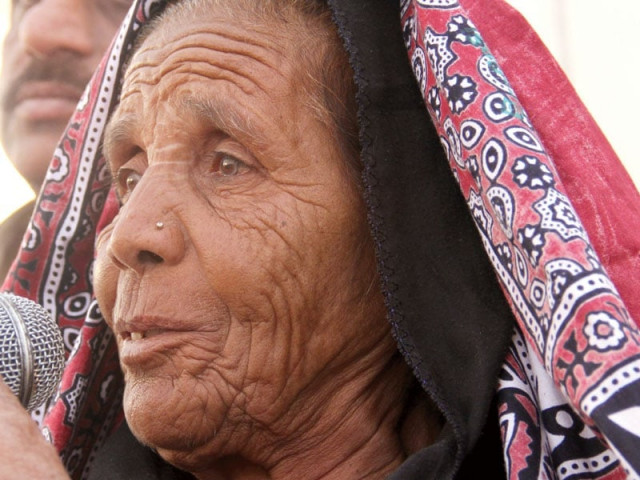A mother’s pain: Mai Jindo is not sure if it was all worth it
15 army personnel kidnapped and executed nine villagers from Tando Bahawal in 1992.

But justice did not come that easily to Mai Jindo, who is now in her 70s. Two of her daughters, Hakimzadi and Zaibunissa, had to set themselves on fire in order to get authorities to take up their brothers cases.
Mai Jindo and other women of her village were invited by the Sindh National Movement to a programme related to the International Women’s Day at the Karachi Press Club on Thursday. Mai got a thunderous round of applause when she got up to speak. “A woman can do anything she wants, if only she is committed to it,” she exclaimed.
Mai is leading a very miserable life these days. While others see her as a symbol against oppressors, she has lost all breadwinners in her family. “I have wept for twenty years. Not a lot of people can understand the kind of pain I am going through.” For her, the memories are still quite fresh. “I got justice and people honour me for my sacrifices, but it has not made my life any more comfortable.”
“People tell me that it’s women’s day today. The government of Benazir Bhutto is in power and helping poor women. But I feel that I am being punished for some unknown reason.” She requested the government to get her grandson a job, so that her remaining family can provide for itself.
Mai lauded the role played by the Sindhi print media, especially Daily Kawish, in helping her quest to get justice.
Those who attended the event seemed to be quite impressed by Mai’s personality, and the suffering she has gone through over the years. One visitor, Sakina, said that women like Mai are role models for the new generation. “She strived and got justice in a period when there was neither a free media nor an independent judiciary. I am proud that people of such character are still present in our society.”
Another woman, Zainab Khatoon, lamented that society had never valued its heroes. “Mai’s story should be included in textbooks,” she said.
Published in The Express Tribune, March 12th, 2012.



















COMMENTS
Comments are moderated and generally will be posted if they are on-topic and not abusive.
For more information, please see our Comments FAQ